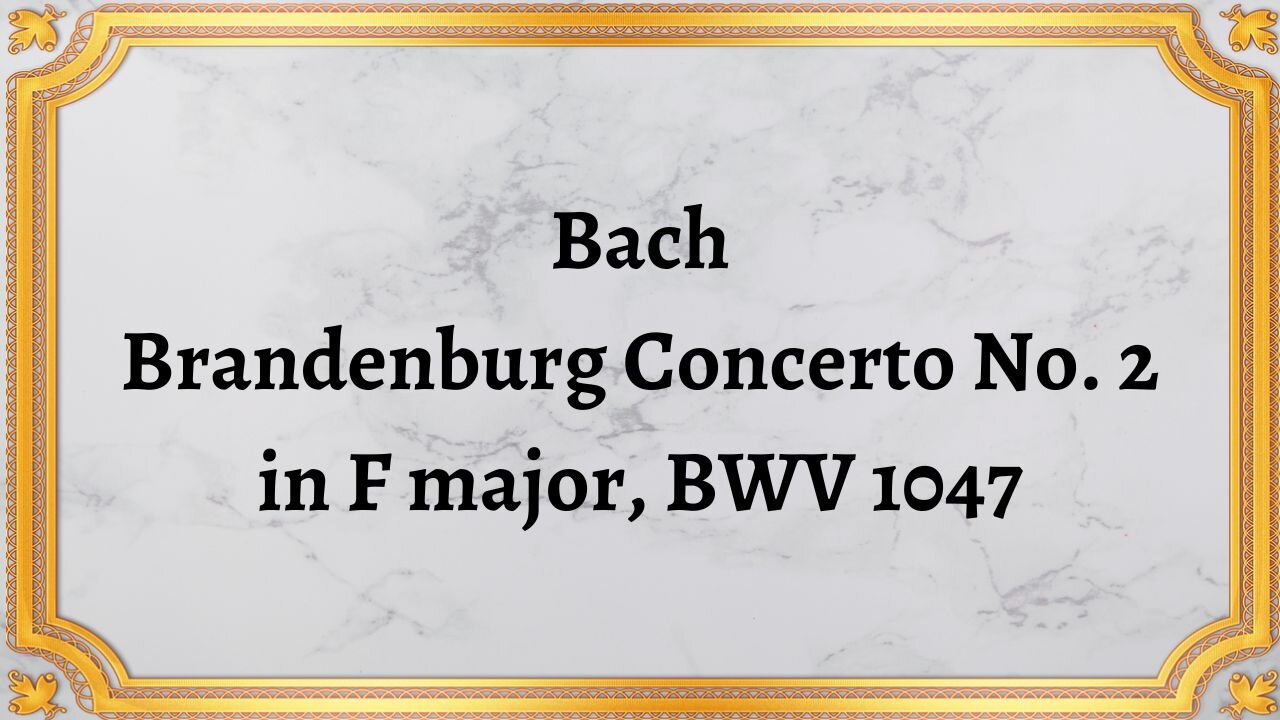Premium Only Content

Bach Brandenburg Concerto No. 2 in F major, BWV 1047
#classical_music #Bach #Brandenburg_Concerto
Bach's Brandenburg Concerto No. 2 in F major, BWV 1047, is perhaps one of the most famous and beloved pieces of Baroque music. It is a stunning display of counterpoint and virtuosity, showcasing Bach's exceptional skill as a composer.
Composed in 1721, the Brandenburg Concerto No. 2 is a significant part of Bach's six concerto pieces written for the Margrave Christian Ludwig of Brandenburg. The piece consists of three large movements: an opening allegro, a hypnotic adagio, and a joyful finale, with a solo quartet comprising of trumpet, recorder, oboe, and violin.
The opening allegro stands out for its fast and flashy passages, full of intricate counterpoint that challenges the performers to execute with precision and clarity. In contrast, the second movement is a hauntingly beautiful adagio, featuring a pastoral melody on the solo recorder that floats above subtle accompaniment from the strings. The third and final movement is where the trumpet takes the lead, with a series of lively and joyful phrases that bring the piece to an exciting and satisfying conclusion.
The centerpiece of the concerto is unquestionably the trumpet solo in the final movement, one of the most recognizable melodies in all of classical music. The technical demands of the piece are immense, and the virtuosic trumpet player must maintain precision and accuracy while navigating some of the most challenging passages written for any instrument.
Bach's Brandenburg Concerto No. 2 is a prime example of his mastery of the Baroque style. The piece showcases Bach's exceptional ability to combine complex contrapuntal lines in a way that is both intellectually stimulating and emotionally moving. It also highlights his ability to experiment with instrumentation, including the use of the trumpet as a solo instrument in a concerto setting.
Overall, the Brandenburg Concerto No. 2 is a masterpiece that continues to captivate and inspire audiences over three centuries after its creation. Its intricate counterpoint, virtuosic solos, and overall beauty make it a timeless work that truly showcases the brilliance of Johann Sebastian Bach.
You have the opportunity to support the channel https://destream.net/live/RadSiarAl/donate
-
 20:26
20:26
Classical music_Music Inspiration
1 month agoJohann Sebastian Bach Orchestral Suite No. 2 in B minor, BWV 1066
862 -
 DVR
DVR
Neil McCoy-Ward
1 hour agoTHE AI JOBS COLLAPSE HAS BEGUN! (And No One’s Ready for What’s Next…)
1 -
 LIVE
LIVE
Side Scrollers Podcast
2 hours agoJOEY SWOLL/HULK HOGAN CONTROVERSY + ONLINE SAFETY ACT + MORE | SIDE SCROLLERS
268 watching -
 LIVE
LIVE
GloryJean
3 hours agoSolo Sniping & WINNING 🖱️ 6.7 K/D
45 watching -
 2:00:46
2:00:46
Steven Crowder
4 hours agoGrading Donald Trump's First 6 Months: Epic Success or Massive Failure?
282K100 -
 55:22
55:22
The Rubin Report
2 hours agoTsunami Evacuation Creates Massive Oprah Winfrey Controversy
20.8K28 -
 LIVE
LIVE
The Mel K Show
2 hours agoMORNINGS WITH MEL K - Signal to Noise: Parasitic Global Governance Agenda 2030 Undeterred & UnAmerican 7-30-25
825 watching -
 LIVE
LIVE
LFA TV
16 hours agoLFA TV ALL DAY STREAM - WEDNESDAY 7/30/25
3,046 watching -
 LIVE
LIVE
The Shannon Joy Show
2 hours ago🔥🔥The Roots Of Technocracy EXPOSED. Dark Enlightenment & The Game B Techno-Beast. Top Experts Patrick Wood, Courtenay Turner & Joe Allen LIVE & Exclusive! 🔥🔥
260 watching -
 46:48
46:48
Grant Stinchfield
2 hours agoLawyers, Lies & Deleted Tweets: The Russia Hoax House of Cards Is Collapsing
2.49K2